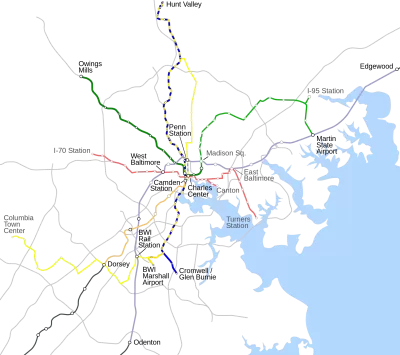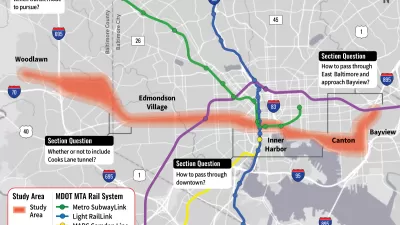The unique structure of the Maryland Transit Administration leaves local stakeholders out of decision-making.

A new report from the Eno Center for Transportation highlights the unique nature of the governance of Baltimore's transit system, the only one of the country's 50 largest state-run transit agencies to operate without a board of directors or local funding. Depending exclusively on federal and state funds, writes Alex Holt in Greater Greater Washington, makes Baltimore "uniquely vulnerable to the whims of each passing Maryland governor."
The report strongly recommends reform, emphasizing the importance of transit governance in determining a system's responsiveness to community needs. Governed by a single administrator, the Maryland Transit Administration (MTA) finds itself at a disadvantage when competing with other state agencies and regions (including the Washington, D.C. metropolitan area) for funding and support. The structure also gives the governor the power to make important decisions about local transit without additional oversight. With transit projects often needing up to a decade to get off the ground, leaving decisions up to governors means many projects get scrapped or forgotten as administrations change.
To remedy the situation, the report presents three possible solutions modeled on Boston, Pittsburgh, and Minneapolis. The suggestions include establishing transit oversight boards, installing a state-level board of directors, and forming a new, more comprehensive transit authority that includes funding and representation from multiple jurisdictions. While some solutions are faster and cheaper than others, the Eno Center report makes clear that the MTA needs drastic reform and more local control in order to effectively serve Baltimore's citizens.
FULL STORY: MTA’s transit governance isn’t working for Baltimore, a new report says

Alabama: Trump Terminates Settlements for Black Communities Harmed By Raw Sewage
Trump deemed the landmark civil rights agreement “illegal DEI and environmental justice policy.”

Study: Maui’s Plan to Convert Vacation Rentals to Long-Term Housing Could Cause Nearly $1 Billion Economic Loss
The plan would reduce visitor accommodation by 25% resulting in 1,900 jobs lost.

Why Should We Subsidize Public Transportation?
Many public transit agencies face financial stress due to rising costs, declining fare revenue, and declining subsidies. Transit advocates must provide a strong business case for increasing public transit funding.

Paris Bike Boom Leads to Steep Drop in Air Pollution
The French city’s air quality has improved dramatically in the past 20 years, coinciding with a growth in cycling.

Why Housing Costs More to Build in California Than in Texas
Hard costs like labor and materials combined with ‘soft’ costs such as permitting make building in the San Francisco Bay Area almost three times as costly as in Texas cities.

San Diego County Sees a Rise in Urban Coyotes
San Diego County experiences a rise in urban coyotes, as sightings become prevalent throughout its urban neighbourhoods and surrounding areas.
Urban Design for Planners 1: Software Tools
This six-course series explores essential urban design concepts using open source software and equips planners with the tools they need to participate fully in the urban design process.
Planning for Universal Design
Learn the tools for implementing Universal Design in planning regulations.
Smith Gee Studio
Alamo Area Metropolitan Planning Organization
City of Santa Clarita
Institute for Housing and Urban Development Studies (IHS)
City of Grandview
Harvard GSD Executive Education
Toledo-Lucas County Plan Commissions
Salt Lake City
NYU Wagner Graduate School of Public Service





























